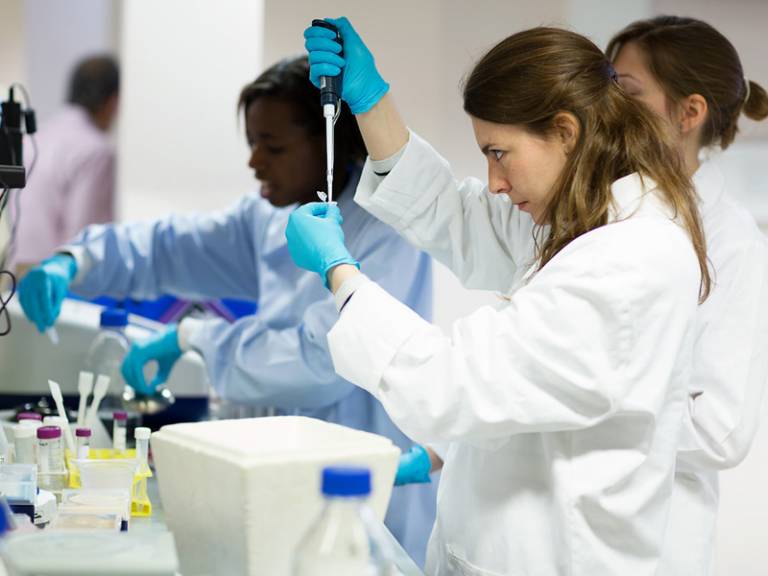UCL ranked in world's top ten universities for science research
10 October 2017
UCL has joined the top 10 universities in the world for its science research, and second in Britain ahead of Cambridge in new international rankings based on quality, productivity and impact.

UCL rose one place to 10th in the world behind Harvard (1st), John Hopkins (2nd), Stanford (3rd), Toronto (4th), Oxford (5th), Washington, Seattle (6th), MIT (7th) Michigan (7th) and University of California, Berkeley (9th), according to the 10th year of rankings produced by the National Taiwan University (NTU). Unlike some other rankings, the NTU concentrates on the sciences spread over 14 subjects grouped into six fields and focuses on research performance with 25% of the assessment based on productivity, 35% on impact and 40% on research excellence.
UCL improved its position in all six fields this year. In the six fields, UCL came 7th in Life Sciences up from 8th (just behind Oxford), and was 9th in Clinical Medicine up from 13 which meant that it was top in the UK, ahead of both Oxford and Cambridge.
UCL came 13th in Social Sciences up from 15th, 33rd in Natural Sciences up for 35th, 77th in Engineering up from 80th and 116th in Agriculture up from 123rd.
In the overall rankings, the UK had eight universities in the top 100. Cambridge came 12th up from 14th, Imperial College, London, was level pegged at 16th, Manchester was 46th, down from 39th while King's College London, was 51st, the same as last year. Edinburgh was 53rd and Bristol rose into top 100 at 98th. Just outside the top 100 were Birmingham and Southampton tied at 108th.
NTU, which first published its rankings in 2007, believes its assessments are a reliable measure of success for universities devoted to scientific research. It is entirely based on scientific papers.
UCL President & Provost Professor Michael Arthur said: "The results reaffirm UCL's position as a world-leading university in science research and is a tribute to the hard work of our academic staff who are drawn from across Britain and throughout the EU and the world.
"We are proud of our international outlook as London's global university and are investing in the future to maintain and improve our international standing across not just the sciences but all subjects.
"I believe that the strength in depth of our research will also help tide us through the uncertainties brought by Brexit and we will continue to press the government to ensure that the science research achievements by UCL and other universities - as demonstrated by these rankings - are safeguarded."
The NTU table follows the Times Higher Education's tables which ranked UCL 16th in the world and fourth in the UK behind Oxford, which came first, Cambridge, which jumped two places to second, and Imperial College London, which was eighth. LSE was 25th and King's College London, 36th.
The results re-affirm UCL's status as a world-leading university following its seventh place in the QS world rankings (third in the UK) and its 16th placing in the ShanghaiRanking world tables (also third in the UK).
In The Times and The Sunday Times league tables which were published last month and more geared towards assessing teaching quality, UCL was again in the top 10, at 7th in the UK, with new figures also showing that UCL's graduates are among the highest paid six months after leaving.
In the individual subjects in the NTU rankings, UCL was 9th in Pharmacology & Toxicology which made it top for the UK, ahead of Imperial, King's, Oxford and Cambridge.
UCL was 29th in Physics, 37th in Computer Science, 39th in Electrical Engineering, 65th in Geosciences, 79th in Chemistry, 87th in Mathematics, 95th in Civil Engineering, 96th in Materials Science, 98th in Environment/Ecology, 113th in Chemical Engineering, 154th in Agricultural Sciences, 190th in Plant & Animal Science and 212th in Mechanical Engineering.
On a different note, UCL has also been named as one of the best universities in Britain for its nightlife in a survey of 8,000 students at more than 120 universities.
It was ranked in the top tier of universities alongside Manchester, Liverpool and Sheffield for its nightlife and was the highest placed university in London apart from the Royal Vetinerary College. Some 81% rated UCL has having a diverse nightlife.
The university also scored highly in the league table on politics with 61% rating it as having a lively political scene. UCL also performed well for its range of student union activities, sport and creative opportunities with positive scores of 71%, 63% and 63%, respectively.
Links
Image
- Essential Lab Skills and Molecular Biology Techniques Workshop, UCL Centre for Cardiovascular Biology (Source: UCL Life Learning)
 Close
Close

